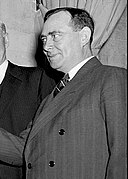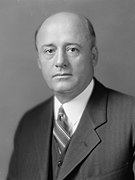| ||||||||||||||||||||||||||||||||||||||||||||||||||||||||||||||
All 435 seats in the United States House of Representatives 218 seats needed for a majority | ||||||||||||||||||||||||||||||||||||||||||||||||||||||||||||||
|---|---|---|---|---|---|---|---|---|---|---|---|---|---|---|---|---|---|---|---|---|---|---|---|---|---|---|---|---|---|---|---|---|---|---|---|---|---|---|---|---|---|---|---|---|---|---|---|---|---|---|---|---|---|---|---|---|---|---|---|---|---|---|
| ||||||||||||||||||||||||||||||||||||||||||||||||||||||||||||||
 | ||||||||||||||||||||||||||||||||||||||||||||||||||||||||||||||
| ||||||||||||||||||||||||||||||||||||||||||||||||||||||||||||||
The 1946 United States House of Representatives elections were elections for the United States House of Representatives to elect members to serve in the 80th United States Congress. They were held for the most part on November 5, 1946, while Maine held theirs on September 9. November 1946 was 19 months after President Harry S. Truman assumed office upon the death of Franklin D. Roosevelt.
While Democrats had controlled the House for 16 years since 1931 and Roosevelt had been elected to a record four terms in office, Truman did not garner the same support as the deceased president. The 1946 election resulted in Republicans picking up 55 seats to win majority control. Joseph Martin, Republican of Massachusetts, became Speaker of the House, exchanging places with Sam Rayburn, Democrat of Texas, who became the new Minority Leader. The Democratic defeat was the largest since they were trounced in the 1928 pro-Republican wave that brought Herbert Hoover to power. They also lost the Senate in the concurrent Senate elections.
The vote was largely seen as a referendum on Truman, whose approval rating had sunk to 32 percent[1] over the president's controversial handling of a wave of post-war labor strikes, including a United Auto Workers strike against Ford and General Motors in 1945, a United Mine Workers strike starting in April 1946, and a national railroad worker strike that began in May. Further damage resulted from the back-and-forth over whether to end wartime price controls, unpopular with the American business constituency, to handle shortages, particularly in meat and other foodstuffs. While Truman's early months in the White House had been plagued with questions of "What would Roosevelt do if he were alive?" Republicans now began to joke "What would Truman do if he were alive?" and "To err is Truman."[2] However, the Republican majority was short-lived, as Democrats regained control of the House two years later.
Cite error: There are <ref group=lower-alpha> tags or {{efn}} templates on this page, but the references will not show without a {{reflist|group=lower-alpha}} template or {{notelist}} template (see the help page).
- ^ Leuchtenburg, William E. (November 2006). "New Faces of 1946: An unpopular president. A war-weary people. In the midterm elections of 60 years ago, voters took aim at incumbents". Smithsonian. Washington, D.C.: Smithsonian Institution. p. 2. Archived from the original on March 20, 2012. Retrieved May 12, 2009.
On October 14, scarcely more than three weeks before midterm elections, Truman bit the bullet. Even when his approval rating dropped to 32 percent, he had told reporters that controls were indispensable. On this night, however, speaking to the largest radio audience since the end of the war, Truman lashed out at "the few men in Congress who, in the service of selfish interests, have been determined for some time to wreck price controls no matter what the cost might be to our people." Then he stunned the nation by announcing that he was lifting controls on meat. With the lid off, prices skyrocketed. The New York Daily News headlined: PRICES SOAR, BUYERS SORE/STEERS JUMP OVER THE MOON. Brickbats flew at the president. "Brother," said Ohio's Clarence J. Brown, chair of the Republican Congressional Committee, "the tide is sweepin' our way."
- ^ Leuchtenburg 2006, p. 1.
© MMXXIII Rich X Search. We shall prevail. All rights reserved. Rich X Search


